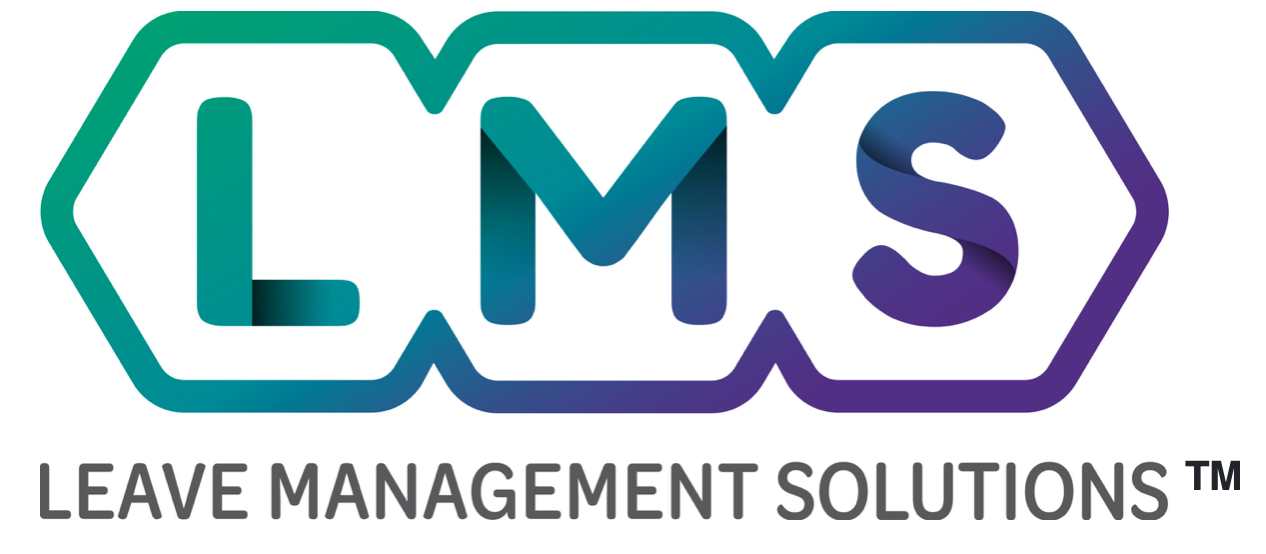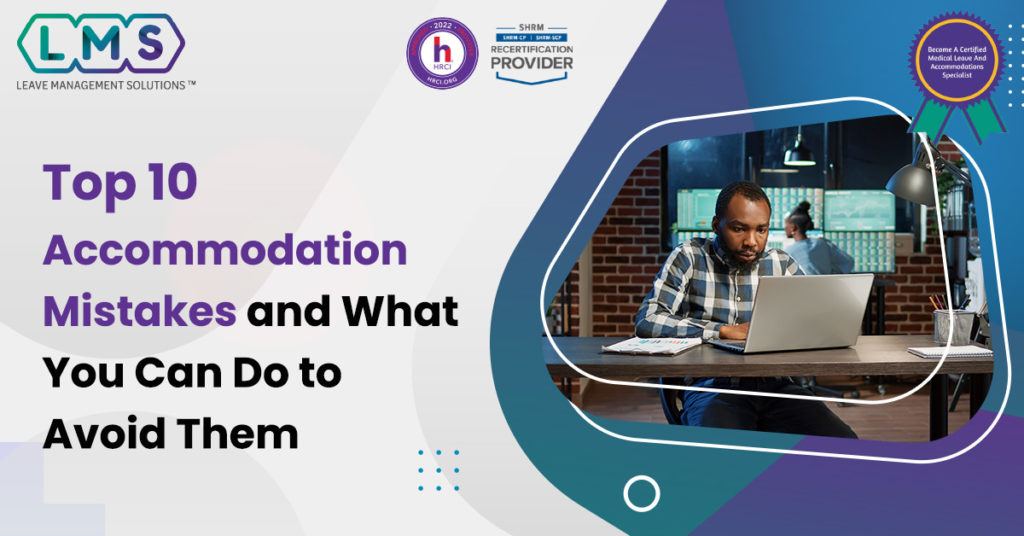The ADA Amendments Act of 2008 changed the ADA’s earlier definition of disability, significantly expanding the opportunities for persons who qualify as disabled. The modifications increased the pressure on employers to provide reasonable adjustments and exposed the possible penalty for businesses that do not strictly adhere to the law. This article offers helpful advice for HR professionals responsible for implementing a compliant medical leave and accommodation management system, to follow and avoid the common blunders.
Top 10 Accommodation Mistakes
When navigating the world of accommodation, HR professionals should avoid the following commonly made mistakes.
- Not Providing a Point of Contact to Employees to Submit Accommodation Requests
An ideal practice means establishing a policy requiring workers to talk with the HR department — rather than their co-workers or supervisors — if they require accommodation. Companies should provide the point of contact during onboarding, when establishing such a policy. In addition, supervisors should be instructed to submit all accommodation requests or observed potential needs, and direct the employee to HR, without further discussing the employee’s accommodation request or their disability.
2. Talking about the Specifics of a Disability
In general, the manager should be aware of the provided accommodation if they need to know for operational or safety reasons. Medical information is considered confidential and need to know only. Managers do not typically need to know about the disability but should be aware of the specific accommodation and any management impacts it, if needed. Cognitive, leaning, stress related disabilities, for example, often require various strategies for communication and information sharing if the condition impacts how the management, co-workers, or client interact with the employee or the way they perform their job tasks.
3. Failing to Consider Reasonable Accommodations Because the Employee Does Not Make any Particular Suggestions
The employer must examine possible accommodations and engage in a Good Faith Interactive Process if an employee informs HR or HR becomes aware of the need for a potential accommodation. Not doing so on the excuse that the employee couldn’t suggest a reasonable accommodation is neither acceptable nor compliant. Enlist the services of a Vocation Consultant, they specialize in finding accommodations for disabled workers. Check out the Job Accommodation Network and clearly document your efforts.
4. Not Considering Other Options to Provide Accommodations
If no reasonable accommodation can be identified to assist the employee in performing their essential job functions, keep engaging and document your efforts. Look for alternatives positions the employee is qualified to perform. Employers should consider all other options before denying an accommodation request, such as reassigning the employee to alternative positions the employee is able to perform, or alternatively, if not an Undue Hardship, granting an unpaid leave of absence, for a clearly identified period of time, or determining if working part-time would be a reasonable, for a specific period of time.
5. Excessive Reliance on The “Undue Hardship”
HR professionals may declare the accommodation request an ‘undue hardship’ for various reasons including impacts to the operations of the organization. However, keep in mind you should have clear objective data to support an ‘undue hardship’ determination.
6. Eliminating Essential Functions Temporarily as an Accommodation
Though this is sometimes a tempting option, it will make it challenging to demonstrate the job function is critical for this role for any other employee who requests removal of an essential function as an accommodation. Furthermore, other employees may argue that the job function should not be required for them either. Even worse, they may file a discrimination lawsuit. It could be a reasonable accommodation to temporarily remove an essential function. But be sure to document why it is reasonable to elimination the requirement to perform this essential function temporarily and document the particular reasons for this decision to avoid allegations of discrimination from other workers.
7. Failure to Consider, Integrate and Implement other Regulations, and EEO Complaints Related to an Employee’s Impairment
There is a need to integrate the multiply policies and regulations that apply to the employees’ medical leave or accommodation request. For example, if the condition of a disabled individual under the ADA qualifies as a serious health condition under FMLA, or a Workers’ Compensation injury or is pregnancy related, the other regulatory compliance requirements and restrictions must also be addressed. This is specific and important when transitioning from FMLA to ADA or when ADA & FMLA apply concurrently, as well as when responding to potential grievances and addressing any related EEO harassment, discrimination and retaliation complaints.
8. Qualified with a Disability Status / Considering Performance / While Determining Reasonable Accommodation
Whether you’re dealing with top performers or underachievers, all employees should be treated equally when requesting accommodation. Employees are Qualified Individuals with a Disability (QID) if they are able to perform all the essential job functions with the accommodation. Will an employee working a modified / part-time work schedule as an accommodation a QID? Who will perform the functions of the full-time position the employee does not? How will that choice impact the organization, their co-workers, the clients/customers/patients? It is imperative the employee’s performance with the accommodation is confirmed, from both the employees’ and employers’ perspective over time.
9. Turning Down a Request from an Employee Because It’s “Impossible”
Employers are responsible for implementing the Good Faith Interactive process and should work with the employee in identifying potential reasonable accommodations. Clearly and objectively document your efforts including utilizing the Job Accommodation Network if an accommodation request is an undue hardship. Even if you still find that the request is not viable, it is critical to follow the entire procedure Good Faith Interactive Process to reach that judgment (and fully record it).
10. Failing to Document a the Accommodation Request Activities and All Contact
Documenting the procedure followed, the QID determination and the applicable accommodation or denial, as well as the confirmation that performance standards are being met with the accommodation or any related grievance, must be maintained in your records. Follow a consistent Integrated Medical Leave and Accommodation Management System™ and it will aid your defense in the case of a lawsuit.
What Employers Can Do To Avoid These Mistakes
HR responsible for Leave and Accommodation must make efforts to shield the organization from liability and mitigate potential EEO complaints and litigation. The following are viable suggestions to help employers do just that.
Maintain Detailed and Accurate Essential Function Job Descriptions
Job descriptions must be kept up to date and cover all essential job functions. Remember that companies have a general obligation to reasonably accommodate employee with disabilities who require an accommodation to perform their essential job functions . However, as part of reasonable accommodation, an employer is not required to eliminate an essential function of a working role.
Essential tasks in a job description, and the standard method of performing those job functions, including identifying the environment, and work tools, equipment and procedures, can show why that requirement is critical to the job. For instance, different job functions might require different abilities such as dealing with stress, speed and tolerance criteria, analyzing, lifting, or standing for long working hours.
Create an Accommodation Policy
Developing, disseminating and implementing a reasonable accommodation Standard Operating Procedure (SOP) and policy helps demonstrate your dedication to adhering to the regulations. Integrating the SOP with the other medical leave regulatory and policy compliance requirements is imperative to minimize and mitigate litigation exposure. In addition, all reasonable accommodation requests should be directed to HR rather than supervisors, as HR specialists are better suited to deal with the intricacies and company/legal and confidentiality concerns associated with processing these sorts of requests.
Supervisors Must Be Trained
If HR requires supervisors to refer employees to HR, managers and supervisors must know how to identify and handle the situation and protect confidentially, if an employee is identified to need a reasonable accommodation. The manager should not answer the request with a yes or no, regardless of whether it is possible or not, and should not informally accommodate the employee, but should instead send the problem to HR.
Furthermore, supervisors must be taught to address possible compliance scenarios and confidentially issues during a job interview, performance review, leave request, or in their day-to-day interactions with employees.
Join Our Workshop ‘In The Trenches’
Suppose you are responsible for creating, implementing, or managing an Integrated Medical Leave and Accommodation Management System™ in your organization. In that case, you must be aware of proper adherence to the state and federal regulations and strategies to identify the disability, how to provide reasonable accommodations, and more.
Our ‘In The Trenches’ 3-Half-Day Livestream Workshop teaches you everything you need to know about managing and integrating ADA and FMLA medical leaves —In CALIFORNIA (look for USA training later this year) from complying with state and federal medical leave and accommodation regulations and policies to learning proven strategies to deal with Related Performance Management, Fraud, and EEO – Harassment, Discrimination, and Retaliation Complaints.
This includes addressing in California: ADA/FEHA, FMLA/CFRA, Pregnancy Disability (PDL), Workers’ Compensation, SDI, PFL, Govt. Benefits, MOUs, Union Contracts, Company Polices, and related Performance Management Systems, EEO Complaints, and the Investigation SOP.
Apart from that, you will:
- Learn to integrate, implement, manage and control FMLA/CFRA, ADA/FEHA, PDL (Pregnancy Disability), and Workers’ Compensation programs, including the ongoing challenges with COVID.
- Manage and Quality Control check Third Party Administrators
- Get operational solutions to your medical leave and accommodation fraud, performance and management challenges
- Get access to free tools, an integrated methodology, and workflows for managing accommodations in the workplace
- Learn to handle related performance management issues and EEO harassment, discrimination, and retaliation challenges
To learn more, join us in our In the Trenches: The Ultimate Guide to Medical Leave and Accommodation Management in California. Learn and Integrated Medical Leaves & Accommodations System™ for your organization. from March 31st to April 1st, 2022 (10:00 am – 2:30 pm PST). Buy your tickets here before it’s too late.
Accommodation and The Success of Your Business
HR and their employers now bare a more significant duty than ever before in providing reasonable accommodations and medical leaves – HR needs to have the expertise to exercise consistency, and unbiased systems – with caution – when dealing with employees’ serious medical and disability-related concerns in the workplace. To keep the organization in compliance and prevent / mitigate costly litigation, HR more than ever should understand the delicacy of an integrated approach to managing, implementing and control medical absences and accommodations in the workplace.
Getting access to medical leave and accommodation knowledge becomes easy when you’re learning from a nationally recognized subject matter expert. Ms. Beth De Lima is an expert witness and has spent over 30 years helping businesses manage medical leaves and accommodations.
And now, she is spreading her years of knowledge to all the HR professionals struggling with compliance. Join our Livestream workshop and learn the details and strategies for Integrated Medical Leaves and Accommodation Management.

